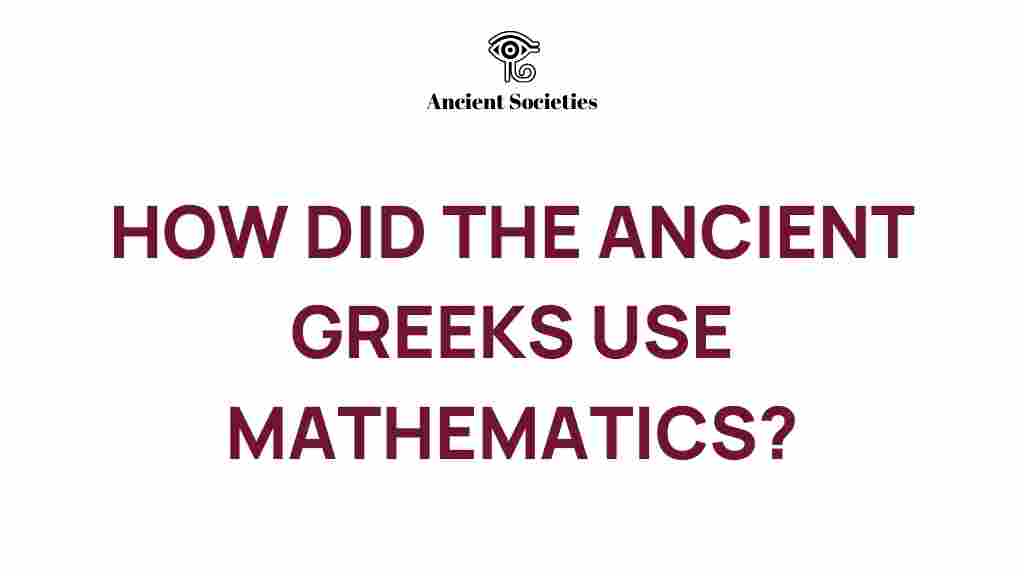Unlocking the Secrets: How Ancient Greeks Mastered Mathematics
The Ancient Greeks stand as a monumental civilization in the history of mathematics, providing a foundation that continues to influence many fields today. Their contributions to mathematics, particularly in geometry, philosophy, astronomy, and algorithms, have shaped not only the mathematical landscape but also the way we perceive and understand the world around us. This article will delve into the remarkable achievements of the Ancient Greeks in mathematics, focusing on key concepts such as the Pythagorean theorem and the philosophical implications of their work.
The Foundation of Ancient Greek Mathematics
Mathematics in Ancient Greece was not merely a series of calculations but rather an exploration of concepts that intertwined with philosophy and the natural world. The Greeks sought to understand the universe through mathematics, leading to profound discoveries and theories.
The Role of Philosophy in Mathematics
Philosophy was integral to the mathematical endeavors of the Ancient Greeks. Mathematicians like Pythagoras and Euclid were not only mathematicians but also philosophers, believing that numbers held the key to understanding the cosmos. Their philosophical inquiries led to the development of mathematical theories that were both abstract and practical.
- Pythagoras: Best known for the Pythagorean theorem, Pythagoras viewed numbers as the essence of reality, believing that they could explain the natural world.
- Euclid: Often referred to as the “father of geometry,” Euclid’s work, particularly in his book “Elements,” laid the groundwork for modern geometry.
Geometry: The Cornerstone of Ancient Greek Mathematics
Geometry was perhaps the most significant branch of mathematics developed by the Ancient Greeks. Their geometric principles were not just theoretical; they were applied in various fields, including architecture, astronomy, and art.
The Pythagorean Theorem
The Pythagorean theorem is one of the most famous mathematical principles attributed to the Ancient Greeks. It states that in a right triangle, the square of the length of the hypotenuse is equal to the sum of the squares of the lengths of the other two sides. This theorem is fundamental in geometry and has practical applications in various fields.
- Formula: If a and b are the lengths of the legs of a right triangle, and c is the length of the hypotenuse, then:
- Pythagorean Theorem: c² = a² + b²
The Pythagorean theorem not only served practical purposes in construction and navigation but also influenced the development of mathematical proofs and logical reasoning.
Euclidean Geometry
Euclid’s “Elements” is a comprehensive compilation of knowledge that covers plane geometry, number theory, and the properties of geometric figures. This work is notable for its systematic approach to geometry using definitions, postulates, and proofs.
- Five Postulates: Euclid’s work is based on five fundamental postulates, including the ability to draw a straight line between any two points and the concept of a circle.
- Influence: Euclid’s methodology influenced mathematicians for centuries and is still taught in geometry classes today.
Astronomy and Mathematics
The Ancient Greeks also made significant strides in astronomy, applying mathematical principles to understand celestial movements. Figures like Aristarchus and Hipparchus utilized mathematics to develop models of the solar system.
Key Contributions to Astronomy
- Aristarchus of Samos: Proposed a heliocentric model, suggesting that the Earth revolves around the Sun, and calculated the sizes and distances of celestial bodies using geometric methods.
- Hipparchus: Known for his star catalog, he developed a system for predicting eclipses and refined the understanding of the Earth’s rotation.
Through their careful observations and mathematical calculations, the Ancient Greeks laid the groundwork for future astronomical studies.
Algorithms and Mathematical Processes
Ancient Greeks were also pioneers in developing algorithms, systematic procedures for solving mathematical problems. Their approaches to problem-solving were foundational in the evolution of mathematics as a discipline.
Euclidean Algorithm
The Euclidean algorithm, attributed to Euclid, is a method for finding the greatest common divisor (GCD) of two numbers. This algorithm remains relevant in modern mathematics and computer science.
- Steps of the Euclidean Algorithm:
- Given two numbers, a and b, where a > b:
- 1. Divide a by b and find the remainder r.
- 2. Replace a with b and b with r.
- 3. Repeat the process until r equals 0. The last non-zero remainder is the GCD.
This algorithm exemplifies the Ancient Greeks’ ability to create structured processes for mathematical problem-solving.
Challenges and Troubleshooting Tips
While studying the mathematics of the Ancient Greeks, one may encounter challenges in understanding their methods and the context in which they developed their theories. Here are some troubleshooting tips:
- Contextual Understanding: Familiarize yourself with the historical context of Ancient Greek civilization. Understanding their philosophy can provide insights into their mathematical concepts.
- Practice Geometric Proofs: Engage in solving geometric problems using Euclidean principles to grasp the logic behind theorems better.
- Explore Modern Applications: Relate ancient theories to modern mathematics and applications, such as computer algorithms, to see their relevance today.
Conclusion
The Ancient Greeks mastered mathematics through a unique blend of philosophical inquiry, geometric exploration, and systematic problem-solving. Their legacy, particularly in geometry and the development of concepts like the Pythagorean theorem, continues to influence modern mathematics, astronomy, and various scientific disciplines. By unlocking the secrets of Ancient Greek mathematics, we not only appreciate their historical contributions but also gain valuable tools for understanding the universe around us.
For further reading on the history of mathematics, you can check out this resource.
To explore more about the fascinating world of Ancient Greeks and their mathematical discoveries, visit this link.
This article is in the category History and created by AncientSocieties Team
